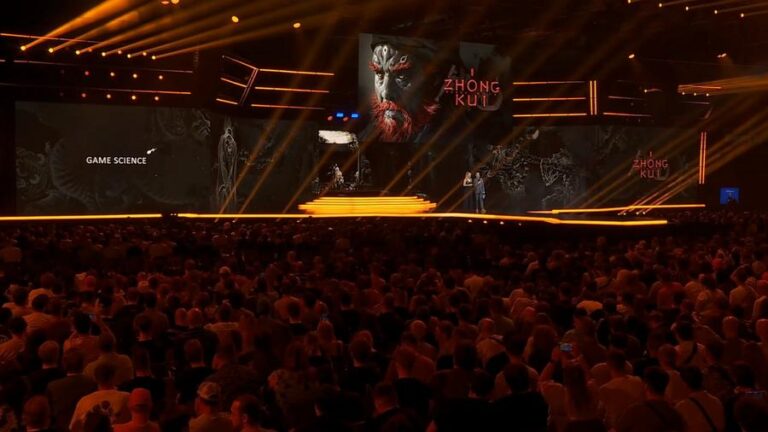by Xinhua writer Zhang Yunlong
BEIJING, Aug. 28 (Xinhua) — Chinese mythology is experiencing a creative renaissance, with recent successes in gaming and film shining a spotlight on the timeless appeal of its classic stories.
A year after the breakout global success of the hit video game “Black Myth: Wukong,” Chinese developer Game Science has unveiled its next project: “Black Myth: Zhong Kui.” Centered on the legendary ghost-queller Zhong Kui, the new installment signals the studio’s ambition to create a broader franchise based on Chinese mythology, rather than just extending “Wukong” with downloadable content (DLC).
The announcement follows a string of milestones. Released on Aug. 20, 2024, “Black Myth: Wukong” quickly became a global sensation. Hitting theaters during the Spring Festival holiday in 2025, “Ne Zha 2” shattered numerous records to become the world’s highest-grossing animated film. More recently, animated film “Nobody” emerged as a surprise hit at China’s summer box office, demonstrating the enduring appeal of mythology-inspired storytelling.
Together, these successes mark more than commercial triumphs. They signal a broader revival of Chinese mythology in popular culture, where ancient legends are being reimagined for new generations — and for audiences worldwide.
GIVING NEW VOICE TO ANCIENT HEROES
At the core of this creative resurgence is a shift in storytelling. Modern creators are not simply retelling old tales — they are reimagining them to address contemporary issues such as identity, choice, and social pressure.
The “Ne Zha” films exemplify this approach. Nezha, the mischievous deity, has been transformed into a symbol of defiance, with the tagline “I am the master of my fate.” The story resonated strongly with young audiences navigating modern societal expectations.
Rao Shuguang, president of the China Film Critics Association, notes that these adaptations reflect a deepening connection between myth and contemporary life. “Traditional myths are only raw material; they need to be processed, deeply reworked,” he told Xinhua. “The key is for creators to forge connections with current societal concerns.”
“Black Myth: Wukong” offers a fresh take on “Journey to the West,” delving into themes of free will, enlightenment and personal growth. Its immersive gameplay invites players to reflect on their own journeys of resistance and transformation.
Shifting the focus from divine heroes to ordinary mythical creatures, “Nobody” serves as a humorous yet poignant take on contemporary life. Its protagonists, led by a pig yaoguai (Chinese monster), wrestle with workplace monotony, social hierarchies, and unspoken pressures. “‘Nobody’ strikes a chord with both adults and kids because it channels this contemporary theme of struggling for autonomy and self-expression,” observes Rao.
Visually, these projects merge traditional aesthetics with modern innovation. “Nobody” integrates ink-wash animation techniques, capturing the fluidity and grace of classical Chinese paintings while employing advanced animation tools to bring its characters to life. “Black Myth: Wukong” uses state-of-the-art graphics to meticulously recreate landscapes and architecture that feel both fantastical and historically grounded.
This blend of past and present is more than technical polish. By rooting their worlds in recognizable cultural motifs, these projects make mythology accessible while reinforcing a strong sense of cultural continuity.
CULTURAL CONFIDENCE GOES GLOBAL
The enthusiastic reception at home and abroad underscores cultural confidence and a growing international curiosity about Chinese stories. With stronger platforms and tools at their disposal, Chinese creators are sharing narratives that challenge stereotypical and oversimplified ideas about “Chinese culture,” offering stories defined by depth, humor and philosophical weight.
Social media reactions illustrate the reach of this trend. Comments such as “has anyone just become completely obsessed with Chinese lore and mythology now?” appear frequently in discussions of “Black Myth: Wukong” on platforms like Reddit, suggesting that myth-driven cultural products are potential gateways to broader engagement with China’s traditions and ideas.
Academics see a broader impact. Shi Anbin, director of the Israel Epstein Center for Global Media and Communication at Tsinghua University, highlights how these works break cultural barriers. “These projects are more than just stories — they are global cultural IPs from China,” he told Xinhua. “In the past, cultural outreach relied on symbols like the panda. Now, we are telling stories with depth and relevance, connecting with the concerns of today’s global youth.”
“Black Myth: Zhong Kui” is generating buzz following the debut of its teaser trailer at the highly anticipated Gamescom Opening Night Live 2025. One netizen commented on YouTube: “Impressive. We need more Chinese folklore to be made into games and movies. With 5,000 years of history, bet there are many more to come!”
In reinterpreting ancient stories, today’s Chinese creators are doing more than preserving the past — they are redefining it for a new generation. Chinese mythology is emerging as a living force in global culture, one that inspires, evolves, and is only beginning to reveal its full power. ■

